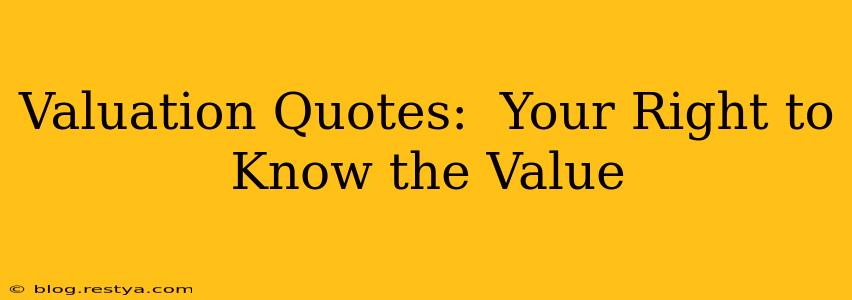Have you ever wondered what your house, your business, or even a prized possession is truly worth? Understanding valuation is crucial, whether you're buying, selling, or simply wanting to understand your assets better. This isn't just about numbers; it's about empowerment – knowing your worth and making informed decisions. This journey into the world of valuation quotes will shed light on what they are, why they matter, and how to navigate this often complex process.
What are Valuation Quotes?
Imagine you're selling your vintage car. You wouldn't just guess at a price; you'd seek professional help to determine its fair market value. That's where valuation quotes come in. A valuation quote is a formal assessment of an asset's worth, provided by a qualified professional. This professional could be an appraiser, a broker, or even a specialist depending on the asset type. The quote uses various methods and considers many factors to arrive at a realistic price. These quotes are vital for making sound financial decisions, especially in high-value transactions.
Why are Valuation Quotes Important?
Valuation quotes are far more than just a number on a piece of paper. They are a critical tool for several reasons:
-
Informed Decision-Making: Whether you're buying or selling, a valuation quote gives you a solid foundation for negotiation. It provides a benchmark, allowing you to make offers or counteroffers based on a realistic assessment, rather than guesswork.
-
Fairness and Transparency: In transactions involving significant sums of money, a professional valuation prevents exploitation. It ensures both parties are dealing with a fair price, reducing the chances of disputes or disagreements later on.
-
Legal and Financial Compliance: In some cases, valuation quotes are a legal requirement. For instance, insurance claims, estate planning, and tax assessments often mandate professional valuation.
What Factors Influence Valuation Quotes?
The process of obtaining a valuation quote isn't a simple formula. Many factors contribute to the final figure. Here are some key elements:
-
Market Conditions: The current state of the market significantly impacts value. A booming market might inflate prices, while a downturn could lead to lower valuations.
-
Asset Condition: For tangible assets like real estate or vehicles, the condition plays a significant role. Wear and tear, maintenance history, and any defects will affect the final valuation.
-
Comparable Sales: Appraisers often look at similar assets that have recently been sold to establish a benchmark for valuation. This method, known as comparable market analysis, is crucial for many types of assets.
-
Location: Location is paramount, particularly for real estate. A property in a desirable neighborhood will generally command a higher valuation than a similar property in a less desirable area.
How to Obtain a Valuation Quote
Getting a reliable valuation quote is essential. Here are steps to ensure you get an accurate assessment:
-
Identify a Qualified Professional: Research and choose a professional with experience and expertise in the specific type of asset you need valued. Check their credentials and reputation.
-
Provide Relevant Information: Gather all necessary documentation about the asset, including ownership details, maintenance records, and any relevant specifications. The more information you provide, the more accurate the valuation will be.
-
Compare Quotes (if possible): It's often wise to obtain multiple quotes from different professionals to compare their assessments and ensure you get a well-rounded perspective.
What are the Different Types of Valuation Methods?
Different valuation methods exist, each suitable for particular asset types:
-
Market Value: This is the most common approach, estimating the price an asset would fetch in a competitive market.
-
Income Approach: Used for income-generating assets, such as rental properties, it estimates value based on the asset's potential to generate income.
-
Cost Approach: This method calculates the value based on the cost of replacing or recreating the asset. It is often used for unique or specialized assets.
What is the Cost of Obtaining a Valuation Quote?
The cost varies depending on the asset's complexity and the professional's fees. Expect to pay a fee based on the asset's value or an hourly rate. It's essential to clarify the fee structure upfront before proceeding.
Can I Get a Free Valuation Quote?
While some companies may offer initial consultations or preliminary assessments at no cost, obtaining a comprehensive and detailed valuation quote typically involves a fee. Free valuations may lack the thoroughness and professionalism required for significant transactions.
In conclusion, understanding valuation quotes is a crucial aspect of responsible financial management. By taking the time to learn the process and engage with qualified professionals, you empower yourself to make informed decisions, ensure fairness, and navigate the world of asset valuation with confidence. Knowing your worth is your right.

